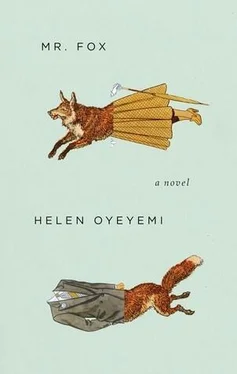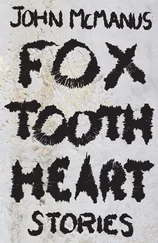I thought I heard something in the next room, a footfall.
I paced through the flat with the reassuring weight of the shepherd’s crook in my hand, checking that all the windows were locked. They were. I was alone. Safe, alone.
All the times I’ve been frightened because of my father. My need for night-lights, my inability to sleep in a room unless I’m able to clearly see all four corners from the bed — and dreams, bad dreams like messengers he sent. All the times he’s frightened me. Die, then, I thought. Die. And I wondered when he would be gone.
I phoned my lawyer, and I phoned his lawyer, and left messages. Long messages. Part of the reason I changed my name was so that my father wouldn’t be able to contact me. Yet somehow he has always been able to find me. His secretary used to send me cheques twice a year, cuts from my father’s investment yield that he instructed her to pass on to me. But I’ve never cashed them, not under any circumstances. When I moved house I left a post office box as my forwarding address, and I haven’t checked it since. You have to be like that when there’s a person like my father in your life; when you leave places you mustn’t look back or you’ll find him there.
“S. J. Fox, psychiatrist,” I murmured. “S. J. Fox, psychiatrist.” Whilst thinking, I was looking at his card. I’d placed it on my bedside table. The card was so plain, so black-and-white and uncreased, that it made everything around it, the frosted-glass lamp that shone light on it, the framed photograph of my cousin Jonas and me, look insubstantial. I was interested in his work, this St. John Fox. Did he know, could he tell, when a fugue state was coming on? The clinic he worked at was in Cornwall, and that was far away. I covered the card with my letters. There was no point invoking psychiatry in this matter. I am sane and it’s well documented that my father is sane. He seemed fully aware of what he’d done, and he was sorry, so sorry. My father is eloquent and sensitive, fair-haired and fair-skinned. His facial expressions flow into one another with mesmerizing transparency, grief, anguish, scorn. “He gets so worked up,” my mother used to say. She said it lovingly. Then she took to saying it in a puzzled way, then with contempt.
There was always something strange about the three of us together. Little things that might have been fun but somehow weren’t fun. One sunny morning my father made my mother lie down — she was laughing, and she said she wanted to do it, but she was an actress; can you trust an actress and a sunny day? — he made her lie down in the garden in her bikini and he wrote all over her. I can’t remember what he wrote; it was a long poem, in blue ink, an original poem, maybe. I was ten going on eleven. I didn’t like what was happening and I didn’t know why. He wrote on her back first, kneeling beside her; then he made her turn over and wrote all across her front, pressing hard, and the letters were big and ugly, but she pranced around afterwards, holding out her arms and saying things like: “Am I in the poem? Or is the poem in me?” And he just sat in a deck chair as if exhausted by his work and watched her. I thought, Something very mad is going on, she doesn’t like this, but she’ll never say so.
I was taken to a theatre matinee for my twelfth birthday treat; that should have been fun, too. We had the best seats possible, because that’s what things were like with my father. My mother was playing Juliet, and the first two scenes dragged— blah, blah, said one actor — Romeo, I presumed. Blah, blah, blah, said a second actor; some relative of Romeo’s. Asking him something; merry but concerned. Blah, blah, blah, blah, Romeo said, looking downcast for a few seconds before proceeding to jump around and climb things. My father stared into space and I felt my eyes begin to close of their own accord. Until Juliet made her airy appearance, soft and slender—“How now! Who calls?” and suddenly we were listening, Father and I, watching, our heads tilting to take her in, as if we’d never seen her before. The stage makeup exaggerated her eyes, but her mouth was still larger, very much larger. Something from the distant past — a great-grandfather who was an African. She was self-conscious about her mouth and called it her clumsy flytrap, but my Aunt Molly told me that that’s how it should be — when a woman’s lips are larger than her eyes it’s a sign that she’s warm-hearted. Her hair was a bright mass of crinkles, a lion’s mane. Romeo embraced her and she gave herself over to him with eager, trembling bliss. There were quite a few embraces, and my father became conspicuously still and watched with startled pain. I was uncomfortable because I’d never seen her like this before, but he’d seen her perform plenty of times. It’s only acting, I thought. Is he always like that when she acts?
After the matinee my parents took me to lunch, and the strangeness was there with us. It was there in the powdery smell of the velvet on the restaurant chairs, and it was there in the palm fronds that tickled my head. My mother and father talked politely about things they had read in the newspaper, and changed the subject whenever it seemed they were about to disagree. As usual, my father ordered something that wasn’t on the menu, just because. He told me to order whatever I liked, and I did. My mother drank martinis and said sharply, “Three whole courses! What a pig you are, Miel.” And I was so surprised I almost cried. It was my birthday. And she’d never said such a thing before. My father and I were silently against her for the rest of the meal, sticking to our plan to order ice cream even though she wasn’t having anything and was ready to leave.
I wish I hadn’t ever been bad to my mother. I see that afternoon again and again. She had acted wonderfully, she had been Juliet, and then we’d met her at the stage door and treated her as if she had done something wrong. We hadn’t said “Well done” to her, or much of anything. My father had just pushed a bunch of flowers into her arms.
Just over two years later, my father killed my mother. She was running away from him down some stairs and he seized her by the hair at the nape of the neck — he must have lifted her onto her tiptoes — and he forced a knife through her chest. From behind. Then he called the police, and waited for them. I was at boarding school, and everyone there knew, because it was in the newspapers, and some of my friends went and lit candles in the school chapel. I found that deeply bogus. All the newspapers were kept away from me so I wouldn’t see what was being said. I didn’t need to read about my mother — I knew her well — we spoke every day until he killed her. She’d moved out of his house, and she was living with her new boyfriend, Sam. She went back to the house to get some things. She had his permission, as long as he didn’t have to see her. So they’d settled on a weekday afternoon — he was supposed to be at the office. But he wasn’t.
He said that she had been turning me against him. (This isn’t true: My father always frightened me. If I had been allowed to testify I’d have said so.) He had a lot of explanations that I wasn’t really able to take in at the time. He said he couldn’t take it anymore.
“It.”
What is “it”? Sometimes I think he killed her to show us something, to show us what “it” is. She was my best friend, and she knew almost everything — if she didn’t know she made outrageous guesses. She made me laugh and I made her laugh. When I spoke to my mother I was the funniest, cleverest, most interesting girl alive. Other people’s mothers told them to “be good” or to “take care.” Mine told me to be bad and wicked and not to worry. While waiting for her to phone me at school I’d feel seconds bursting inside me and leaving clouds. That won’t come again — it can’t. I’ll never have that with anyone else. I’ll never even come close.
Читать дальше












